Related Research Articles
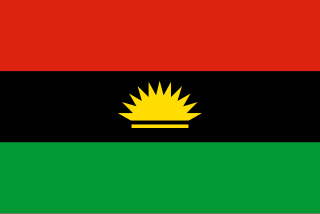
Biafra, officially the Republic of Biafra, was a partially recognised country in West Africa that declared independence from Nigeria and existed from 1967 until 1970. Its territory consisted of the former Eastern Region of Nigeria, predominantly inhabited by the Igbo ethnic group. Biafra was established on 30 May 1967 by Igbo military officer and Eastern Region governor Chukwuemeka Odumegwu Ojukwu under his presidency, following a series of ethnic tensions and military coups after Nigerian independence in 1960 that culminated in the 1966 anti-Igbo pogrom. The Nigerian military proceeded in an attempt to reclaim the territory of Biafra, resulting in the start of the Nigerian Civil War. Biafra was officially recognised by Gabon, Haiti, Ivory Coast, Tanzania, and Zambia while receiving de facto recognition and covert military support from France, Portugal, Israel, South Africa and Rhodesia. After nearly three years of war, during which around two million Biafran civilians died, president Ojukwu fled into exile in Ivory Coast as the Nigerian military approached the capital of Biafra. Philip Effiong became the second president of Biafra, and he oversaw the surrender of Biafran forces to Nigeria.

The Nigerian Civil War, also known as the Biafran War, was a civil war fought between Nigeria and the Republic of Biafra, a secessionist state which had declared its independence from Nigeria in 1967. Nigeria was led by General Yakubu Gowon, and Biafra by Lieutenant Colonel Chukwuemeka "Emeka" Odumegwu Ojukwu. The conflict resulted from political, ethnic, cultural and religious tensions which preceded the United Kingdom's formal decolonisation of Nigeria from 1960 to 1963. Immediate causes of the war in 1966 included a military coup, a counter-coup, and anti-Igbo pogroms in the Northern Region. The pogroms and the exodus of surviving Igbos from the Northern Region to the Igbo homelands in the Eastern Region led the leadership of the Eastern Region to conclude that the Nigerian federal government would not protect them and that they must protect themselves in an independent Biafra.

The Movement for the Actualization of the Sovereign State of Biafra (MASSOB) is a secessionist movement in Nigeria, associated with Igbo nationalism, which supports the recreation of an independent state of Biafra. It was founded in 1999 and is led by an Indian-trained lawyer Ralph Uwazuruike, with headquarters in Okwe, in the Okigwe district of Imo State.
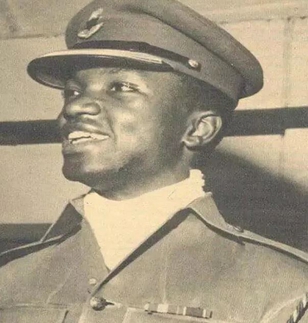
Lieutenant-Colonel Patrick Chukwuma "Kaduna" Nzeogwu was a Nigerian military officer who played a leading role in the 1966 Nigerian coup d'état, which overthrew the First Nigerian Republic.

The flag of Biafra, used by the Republic of Biafra during the Nigerian Civil War (1967–1970), consists of a horizontal tricolour of red, black, and green, charged with a golden rising sun over a golden bar. The eleven rays of the sun represent the eleven former provinces of Biafra. The rays are typically long and slender with the lowest rays being nearly horizontal and the remaining rays spread evenly between.

The Nigeria Police Force is the principal law enforcement and the lead security agency in Nigeria. It was designated by the 1999 constitution as the national police of Nigeria, with exclusive jurisdiction throughout the country. As at 2021, it had a staff strength of about 371,800. There are currently plans to increase the force to 650,000, adding 280,000 new recruits to the existing 370,000. The Nigeria Police Force is a very large organisation consisting of 36 State commands and Federal Capital Territory (FCT) grouped into 17 zones and 8 administrative organs. As at July 2024, the NPF is headed by IGP Kayode Egbetokun. In 2020, it underwent major overhauls.

Oji River is a Local Government Area of Enugu State, Nigeria. It borders Anambra State and Abia State. Its headquarters are in the town of Oji River. The towns within Oji River L G A are:- Inyi, Achi Agụ, Achị Ụlọ, Awlaw, Akpugoeze, Oji-River Urban and Ugwuoba.

The fall of Enugu was a military conflict between Nigerian and Biafran forces in September and October 1967 during the Nigerian Civil War which centered around Enugu, the capital of the secessionist Republic of Biafra. Nigerian federal forces had made Enugu's capture a priority shortly after war broke out, but their advance stalled at Nsukka. Biafran president and leader Odumegwu Ojukwu, attempted to distract the Nigerian Army by initiating an invasion of Nigeria's Mid-Western Region in August, but the offensive was brought to a halt. Lieutenant Colonel Theophilus Danjuma took charge of the Nigerian forces at the Nsukka front and prepared to advance on Enugu with seven battalions of the 1st Division. Enugu was garrisoned by one brigade led by Colonel Alexander Madiebo and poorly armed civilians called into service. Danjuma decided to launch an offensive with his forces spread over a broad front to make it more difficult for the Biafrans to block them along major roads as had happened up to that point.
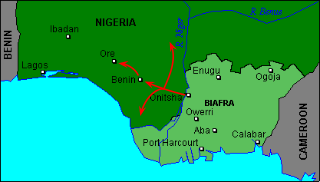
The Midwest Invasion of 1967 or Midwest Offensive, codenamed Operation Torch, was a military operation between Nigerian and Biafran military forces during the Nigerian Civil War. The invasion began on August 9 when 3,000 Biafran soldiers led by General Victor Banjo crossed the River Niger Bridge into Asaba. Upon reaching Agbor, the Biafrans split up. With the 12th Battalion moving west capturing Benin City and Ore, the 18th Battalion swung south, taking Warri, Sapele and Ughelli, while the 13th Battalion headed north for Auchi, Agenebode and Okene. Simultaneously, a plot to capture Mid-Western Governor David Ejoor at his home in Benin failed. Nevertheless, the Biafrans, meeting virtually no resistance, had seized the entire Mid-Western Region in less than 12 hours.
The 2014 Enugu Government House Attack was carried out on 8 March 2014, when members of the militant group Biafra Zionist Federation took control of the state house for about 4 hours and erected the flag of Biafra at the entrance of the house. The leader of the group Barrister Benjamin Onwuka gave Nigerians living in Biafran territory an ultimatum to vacate their land before 31 March 2014 or face the bloodbath that will come afterward.

Nnamdi Okwu Kanu is a British political activist known for advocating for the secession and independence of Biafra from Nigeria. He is the leader of the Indigenous People of Biafra (IPOB), which he founded in 2012. The main aim of IPOB is to restore the defunct Republic of Biafra which existed in Nigeria's Eastern Region during the Nigerian Civil War of 1967–1970.

The Indigenous People of Biafra (IPOB) is a separatist group in Nigeria that aims to restore the defunct Republic of Biafra, a country which seceded from Nigeria in 1967 prior to the Nigerian Civil War and was subsequently dissolved following its defeat in 1970. Since 2021, IPOB and other Biafran separatist groups have been fighting a low-level guerilla conflict in southeastern Nigeria against the Nigerian government. The group was founded in 2012 by Nnamdi Kanu who has been the leader and Uche Mefor, who served as the deputy leader.
The 2015–2016 Killing of Biafran Protesters refers to the killing of demonstrators demanding the restoration of the sovereignty of the Republic of Biafra by Nigerian security forces, especially the Nigerian army, across the southeastern parts of Nigeria. The demonstrations were spearheaded by several separatist movements. In addition, residents of the above-mentioned region have often been subjected to conditions synonymous with those obtainable in a Police State.
Nimbo is a border town in Uzo-Uwani area of Enugu State, Nigeria, where seven villages- Ekwuru, Nimbo-Ngwoko, Ugwuijoro, Ebor, Enugu-Nimbo, Umuome and Ugwuachara were invaded, and scores massacred by over 500 armed Fulani herdsmen, rated the fourth deadliest terror group in the world, in the early hours of April 25, 2016. Uzo Uwani has boundaries with the Southern States of Ebonyi and Anambra, and Central States of Benue and Kogi, where these attacks have increased lately.
The Biafra Zionist Front (BZF), formerly known as the Biafra Zionist Movement and also known as the Biafra Zionists Federation, is a group agitating for the restoration of Biafra and its independence from Nigeria. It is led by Benjamin Onwuka. The movement's purpose is the actualization of the sovereign state of Biafra along precolonial lines.

Igbo nationalism is a range of ethnic nationalist ideologies relating to the Igbo people of southeastern Nigeria. While the term is defined as seeking Igbo self-determination by some, others argue that it refers to the preservation and revival of Igbo culture and, for others, the development of Igboland stemming from the philosophy, Aku luo uno, which means "wealth builds the home".
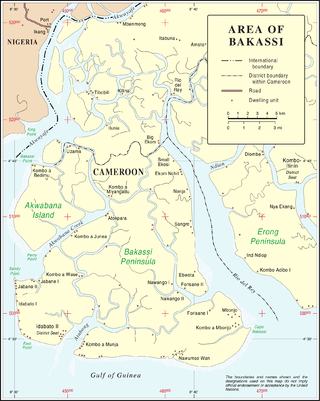
The Bakassi conflict is an ongoing armed dispute over the Bakassi Peninsula of Cameroon. Originally subject to a border conflict between Cameroon and Nigeria, Bakassi later became affected by insurgencies waged by local separatists against Cameroonian government forces.
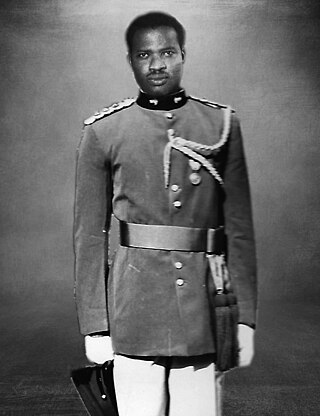
Ejike Ebenezer Obumneme Aghanya was a military officer and electrical engineer who served in the Nigerian Army and the Biafran Armed Forces, retiring as a colonel. Accused of involvement in the 1966 Nigerian coup d'état he was arrested and imprisoned without trial until the outbreak of the Nigerian Civil War where he served on the side of Biafra, holding key positions in the Biafran Armed Forces. He was the head of the Biafran Agency for Research and Production (RAP) which produced bombs, rockets, missiles, as well as ammunition, armored vehicles, telecommunication gadgets and petroleum refineries among others for the Biafran Armed Forces. Later he was the Chief of Staff of the Biafran Organisation of Freedom Fighters (BOFF) which was the guerrilla warfare and special operations arm of the Biafran Armed Forces. He also served as Battalion Commander, 44th Electrical and Mechanical Engineer Battalion Biafran Army and later Brigade Commander of the 58th Brigade of 12th Infantry Division Biafran Army during the war.

The insurgency in Southeastern Nigeria is a military conflict that broke out in the city of Orlu, Imo State, Nigeria on 16 January 2021, when the Nigerian Army moved to crush the paramilitary wing of the Indigenous People of Biafra (IPOB), the Eastern Security Network (ESN). The conflict escalated after the ESN managed to repulse the initial push by the Nigerian Army, but IPOB ended the initial crisis by unilaterally withdrawing the ESN from Orlu. After a few weeks of quiet, Nigeria launched a military offensive in the area to destroy the ESN. On 19 February 2021, IPOB declared that as of the day before, a state of war existed between Nigeria and Biafra. Three weeks later, another separatist group declared the formation of a Biafran interim government which was subsequently endorsed by IPOB. Since then, the Biafran separatists have begun to form alliances with other separatist groups in Nigeria and Cameroon. Despite these developments, the separatists claimed that their militant operations were mainly aimed at defending local communities from armed herders and bandits instead of fighting the Nigerian government. In late June, IPOB leader Nnamdi Kanu was arrested by Interpol and handed over to Nigerian authorities.

Ekpa Simon Njoku, generally known as Simon Ekpa, is a Finnish politician and Biafran political activist. In 2022, while in Finland, he declared the activation of the Biafra Government In Exile (BGIE), and in 2023 declared himself the leader of the Biafra Republic Government in Exile (BRGIE).
References
- ↑ Tony Edike (2014-06-06). "Pro-Biafra Group bid to seize Enugu Radio and TV station foiled". vanguardngr.com. Retrieved 11 July 2014.
- ↑ "BZF attempts to seize Enugu Radio Station". akpraise.com. Archived from the original on 15 July 2014. Retrieved 11 July 2014.
- ↑ Emmanual Uzordinma (5 July 2014). "Biafra Group attempt to seize Enugu Radio, TV station. Kills Police officer". dailypost.ng. Retrieved 11 July 2014.
- ↑ IHUOMA CHIEDOZIE (5 July 2014). "Two Killed in an attempt to declare Biafra in Enugu". punchng.com. Archived from the original on 6 June 2014. Retrieved 11 July 2014.